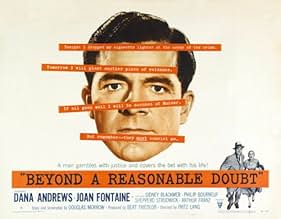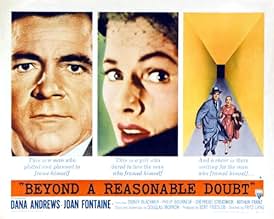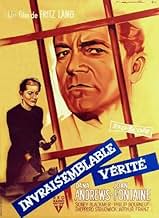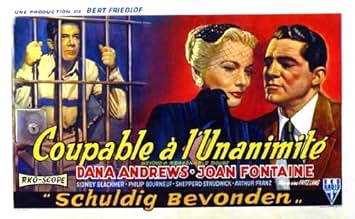IMDb RATING
6.9/10
6.4K
YOUR RATING
A novelist aided by his future father-in-law conspires to frame himself for the murder of a burlesque dancer as part of an effort to ban capital punishment.A novelist aided by his future father-in-law conspires to frame himself for the murder of a burlesque dancer as part of an effort to ban capital punishment.A novelist aided by his future father-in-law conspires to frame himself for the murder of a burlesque dancer as part of an effort to ban capital punishment.
- Awards
- 1 nomination total
William F. Leicester
- Charlie Miller
- (as William Lester)
- Director
- Writer
- All cast & crew
- Production, box office & more at IMDbPro
6.96.3K
1
2
3
4
5
6
7
8
9
10
Featured reviews
Not as taut as it should have been or as meaningful
Tom Garrett is a writer engaged to the daughter of wealthy newspaper man Austin Spencer. Spencer is also firmly against the death penalty. With Tom looking for a subject for a second novel, Spencer suggests that they set Tom up for an unsolved murder using circumstantial evidence to prove how easy it would be for the courts to kill an innocent man. Once Tom is sentenced to the chair, Spencer will expose the failings in the system and free him. However when Spencer is killed in car crash and none of the evidence can be found then Tom faces the chair.
A very interesting concept still needs a good delivery to make for a good film. This not only had a good idea but it was also a fair point to be made about the death penalty. The film moves along with a good build up for the whole first half. However once Tom finds himself in real trouble then the film strangely doesn't manage to deliver as much tension as it really should have done. Conversely the film becomes more of a melodrama for a while and it loses a lot of momentum. There are some nice touches at the end but they can't completely make up for the weaknesses in the middle section.
It is quite atmospheric but not to the point that I had hoped but Lang does a good job on direction. The cast are OK. Andrews has long been one of my favourite actors from the period and he gives a solid if unspectacular show here. Fontaine is weaker and doesn't quite convince as well as Andrews but is fine. Blackmer is pretty enjoyable as Austin Spencer and Ed Binns is a familiar face as Lt. Kennedy.
It doesn't quite work as you'd hope as the tension drops off at the exactly the moment that it needs to step up a notch. It is worth watching but it is not one of Lang's better films.
A very interesting concept still needs a good delivery to make for a good film. This not only had a good idea but it was also a fair point to be made about the death penalty. The film moves along with a good build up for the whole first half. However once Tom finds himself in real trouble then the film strangely doesn't manage to deliver as much tension as it really should have done. Conversely the film becomes more of a melodrama for a while and it loses a lot of momentum. There are some nice touches at the end but they can't completely make up for the weaknesses in the middle section.
It is quite atmospheric but not to the point that I had hoped but Lang does a good job on direction. The cast are OK. Andrews has long been one of my favourite actors from the period and he gives a solid if unspectacular show here. Fontaine is weaker and doesn't quite convince as well as Andrews but is fine. Blackmer is pretty enjoyable as Austin Spencer and Ed Binns is a familiar face as Lt. Kennedy.
It doesn't quite work as you'd hope as the tension drops off at the exactly the moment that it needs to step up a notch. It is worth watching but it is not one of Lang's better films.
Too strained and imperfect for even Lang, Fontaine, and Andrews? Yes, sadly.
Beyond a Reasonable Doubt (1956)
An early wide screen black and white drama that marks the end of Fritz Lang's American career and also shows the winding down of two great stars, Joan Fontaine and Dana Andrews. The film is no send off, exactly, but it is slightly tired, as if the formula of movie-making needs a twist and it isn't here.
That's not the point, of course. This is now the mid-fifties, crisis time for Hollywood, and with widescreen (and widescreen color) movies making a final jab at the rise of television. The plot is sensational, and not too far from what an extended early television drama might try, with mostly interior shooting and a staged (sometimes stagey) presentation. In all it's not Lang's best, and he was a master at both noir/expressionist drama and at getting to the human dilemma of fate and murder.
Andrews and Fontaine are not a bad pair—both are matched in calm and sophistication, and beauty, even, though Fontaine seems like an accessory until the very end. Andrews rules the plot, which makes him out to be a writer desperate for a new story. So desperate he's going to pretend to commit a murder just to test the justice system.
It's all so outrageous you want to believe it, though your mind says it just wouldn't happen. It's too convenient, and one man's suggestion from the newspaper turns out to be the other man's reality. Enough said!
Oddly enough, this is an RKO distribution even after the studio's demise (I don't know the reasons there) but it might point to a less than perfect crew. Certainly the cinematographer, which Lang relied on greatly in earlier films, is no one with credentials. Likewise the editing and writing are fairly routine, even lackluster. And so if a movie that depends on some psychological intensity is really a bit of a grunt effort, whatever the star power involved, it's a bit doomed.
So watch this if you are curious about any of the parts. I'm a fan of all three of the principles here, and so had to watch it. But I didn't walk away impressed.
An early wide screen black and white drama that marks the end of Fritz Lang's American career and also shows the winding down of two great stars, Joan Fontaine and Dana Andrews. The film is no send off, exactly, but it is slightly tired, as if the formula of movie-making needs a twist and it isn't here.
That's not the point, of course. This is now the mid-fifties, crisis time for Hollywood, and with widescreen (and widescreen color) movies making a final jab at the rise of television. The plot is sensational, and not too far from what an extended early television drama might try, with mostly interior shooting and a staged (sometimes stagey) presentation. In all it's not Lang's best, and he was a master at both noir/expressionist drama and at getting to the human dilemma of fate and murder.
Andrews and Fontaine are not a bad pair—both are matched in calm and sophistication, and beauty, even, though Fontaine seems like an accessory until the very end. Andrews rules the plot, which makes him out to be a writer desperate for a new story. So desperate he's going to pretend to commit a murder just to test the justice system.
It's all so outrageous you want to believe it, though your mind says it just wouldn't happen. It's too convenient, and one man's suggestion from the newspaper turns out to be the other man's reality. Enough said!
Oddly enough, this is an RKO distribution even after the studio's demise (I don't know the reasons there) but it might point to a less than perfect crew. Certainly the cinematographer, which Lang relied on greatly in earlier films, is no one with credentials. Likewise the editing and writing are fairly routine, even lackluster. And so if a movie that depends on some psychological intensity is really a bit of a grunt effort, whatever the star power involved, it's a bit doomed.
So watch this if you are curious about any of the parts. I'm a fan of all three of the principles here, and so had to watch it. But I didn't walk away impressed.
The Elephant in the Room: Obstruction of Justice
While Sidney Blackmer and Dana Andrews cook up and carry out their scheme to prove that an innocent person can be convicted of a murder, everyone ignores the fact that, by getting this innocent person convicted, they're helping the real murderer escape justice. Just sayin'.
An Arranged Jackpot
In his last film in the USA before returning to Germany where he had left to escape the Nazis in the Thirties, Fritz Lang takes up the case of capital punishment and its application, especially when the case is a circumstantial one.
Unlike the remake of Beyond A Reasonable Doubt with Jesse Metcalfe as the reporter and Michael Douglas as a corrupt District Attorney, both Sidney Blackmer as a newspaper publisher and Sheppard Strudwick as the politically ambitious DA hold each other in respect. Blackmer is not happy with Strudwick running up a string of murder convictions as a platform to be governor.
He and prospective son-in-law Dana Andrews agree to frame Andrews with a string of manufactured evidence all carefully documented with photographs to have the police arrest him for murder of a burlesque queen that the police are stumped about. It certainly works all right, but as the case is coming to verdict, Blackmer is killed in an automobile accident and the evidence burn with him. Andrews is left in quite the jackpot.
How it all works out is for you to see. Andrews is not abandoned by fiancé Joan Fontaine who is Blackmer's daughter. She does what she can and toward the end of the film her performance dominates.
Fritz Lang certainly builds the tension worthy of Alfred Hitchcock himself. One scene did have me baffled. After the police have gotten those arranged clues, Andrews makes some moves on burlesque dancer Barbara Nichols who resists his advances. I could not quite believe that one at all.
This original version is a notch or two above the Metcalfe/Douglas remake. Though it got an interesting alternative remake, this is still the one to see.
Unlike the remake of Beyond A Reasonable Doubt with Jesse Metcalfe as the reporter and Michael Douglas as a corrupt District Attorney, both Sidney Blackmer as a newspaper publisher and Sheppard Strudwick as the politically ambitious DA hold each other in respect. Blackmer is not happy with Strudwick running up a string of murder convictions as a platform to be governor.
He and prospective son-in-law Dana Andrews agree to frame Andrews with a string of manufactured evidence all carefully documented with photographs to have the police arrest him for murder of a burlesque queen that the police are stumped about. It certainly works all right, but as the case is coming to verdict, Blackmer is killed in an automobile accident and the evidence burn with him. Andrews is left in quite the jackpot.
How it all works out is for you to see. Andrews is not abandoned by fiancé Joan Fontaine who is Blackmer's daughter. She does what she can and toward the end of the film her performance dominates.
Fritz Lang certainly builds the tension worthy of Alfred Hitchcock himself. One scene did have me baffled. After the police have gotten those arranged clues, Andrews makes some moves on burlesque dancer Barbara Nichols who resists his advances. I could not quite believe that one at all.
This original version is a notch or two above the Metcalfe/Douglas remake. Though it got an interesting alternative remake, this is still the one to see.
Fritz Lang's last American film
This film features Dana Andrews as Tom Garrett, a novelist who is facing a deadline by his publisher to complete his next book. His future father-in-law, Austin Spencer, works has an editor for the big newspaper in town. Spencer has enough clout as an editor that he's regularly in touch with the District Attorney and local law enforcement. Spencer is also anti-capital punishment and is often at odds with the DA, who is very much pro-capital punishment. Spencer feels that the DA feels no qualms about sentencing people to death, because he wants to be seen as the man who makes someone pay for whatever crime he's prosecuting--regardless of whether he presents hard evidence or circumstantial.
An execution is presented at the beginning of the film. Through conversations between Garrett and Spencer and later, Garrett, Spencer and the DA, we learn that the DA has been thought of as taking the most inconsequential circumstantial evidence and manipulating it in court to make it seem like hard fact. Spencer feels like the DA often is grasping at straws, but because he wants to be seen as bringing justice to crimes, he is willing to manipulate any jury into a conviction. Spencer questions the DA about letting a potentially innocent man take the fall based on circumstantial evidence and not actual fact. The DA seems nonchalant about the whole thing.
For his book, Spencer suggests to Garrett that he write a book about someone who is convicted of a crime based on circumstantial evidence. 1) It will give Garrett something to write about, and 2) Spencer will hopefully be able to prove his point to the DA that innocent men could be convicted and executed based on circumstantial evidence. The plan is that Garrett and Spencer will find a crime where the police have no leads. They will then plant evidence in order to focus the police attention on Garrett as the possible perpetrator and implicate him in a crime. They're hoping that Garrett will be arrested and brought to trial. Along the way, Spencer and Garrett plan on taking photos of Garrett planting the evidence so that the photos can be presented to the court in the event that Garrett is convicted of the crime.
You just know from the get-go that something is going to go wrong. Otherwise, where's the suspense? What I did not expect was the ending of the film. What a great twist.
Joan Fontaine is rather wasted in her thankless role as Susan Spencer, Andrews' fiancee and daughter of Austin Spencer. Her finest moment in the film is towards the end, but even then, I think many other actresses could have handled the part--it wouldn't have required an Oscar winner.
An execution is presented at the beginning of the film. Through conversations between Garrett and Spencer and later, Garrett, Spencer and the DA, we learn that the DA has been thought of as taking the most inconsequential circumstantial evidence and manipulating it in court to make it seem like hard fact. Spencer feels like the DA often is grasping at straws, but because he wants to be seen as bringing justice to crimes, he is willing to manipulate any jury into a conviction. Spencer questions the DA about letting a potentially innocent man take the fall based on circumstantial evidence and not actual fact. The DA seems nonchalant about the whole thing.
For his book, Spencer suggests to Garrett that he write a book about someone who is convicted of a crime based on circumstantial evidence. 1) It will give Garrett something to write about, and 2) Spencer will hopefully be able to prove his point to the DA that innocent men could be convicted and executed based on circumstantial evidence. The plan is that Garrett and Spencer will find a crime where the police have no leads. They will then plant evidence in order to focus the police attention on Garrett as the possible perpetrator and implicate him in a crime. They're hoping that Garrett will be arrested and brought to trial. Along the way, Spencer and Garrett plan on taking photos of Garrett planting the evidence so that the photos can be presented to the court in the event that Garrett is convicted of the crime.
You just know from the get-go that something is going to go wrong. Otherwise, where's the suspense? What I did not expect was the ending of the film. What a great twist.
Joan Fontaine is rather wasted in her thankless role as Susan Spencer, Andrews' fiancee and daughter of Austin Spencer. Her finest moment in the film is towards the end, but even then, I think many other actresses could have handled the part--it wouldn't have required an Oscar winner.
Did you know
- TriviaFinal American film made by Fritz Lang before returning to Germany. It was a box-office failure.
- GoofsIt makes no sense for Austin to stash the pictures in the safe while stashing the letter in a deposit box, especially considering the pictures and the information written on them were apparently used as a reference in the writing of the letter.
- Quotes
Tom Garrett: Well, could I get in touch with you?
Dolly Moore: You've touched enough already!
- ConnectionsFeatured in Private Property (1960)
- SoundtracksBeyond A Reasonable Doubt
Sung by The Hi-Los (as The Hi-Lo's)
Music by Herschel Burke Gilbert
Lyrics by Alfred Perry
- How long is Beyond a Reasonable Doubt?Powered by Alexa
Details
- Release date
- Country of origin
- Language
- Also known as
- Más allá de la duda
- Filming locations
- Chicago, Illinois, USA(location shooting)
- Production company
- See more company credits at IMDbPro
- Runtime
- 1h 20m(80 min)
- Color
Contribute to this page
Suggest an edit or add missing content










































